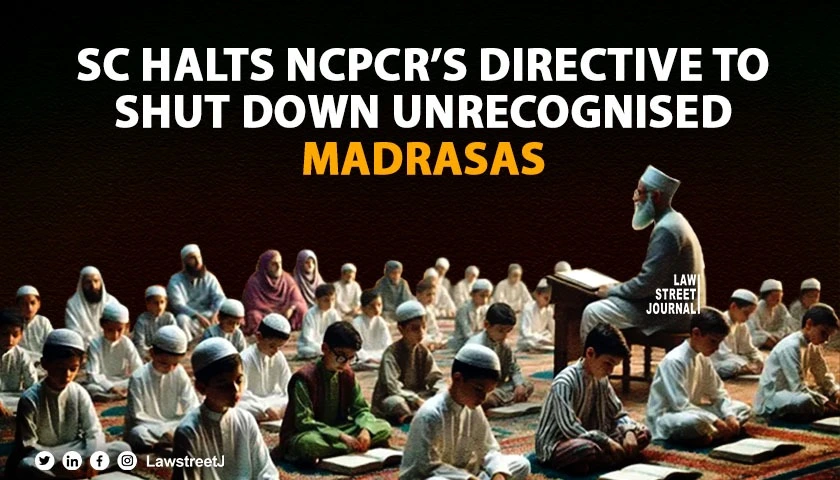NEW DELHI: The Supreme Court on Monday asked the Centre and States not to act on communications issued by child rights body NCPCR asking states to shift students of unrecognised madrasas to government schools in view of violation of the Right to Education Act over there.
A bench of Chief Justice of India D Y Chandrachud and Justices Justices J B Pardiwala and Manoj Misra restrained the Centre and the State from acting on the letters issued by the NCPCR.
Supreme Court Stays NCPCR’s Directive on Madrasa Students’ Relocation
Senior advocate Indira Jaising, appearing for Jamiat Ulema-i-Hind, contended that the communications of the National Commission for Protection of Child Rights and consequential actions of some of states, including the UP, and Tripura needed to be stayed.
The Muslim scholars organisation has challenged the action of UP and Tripura governments directing that students of unrecognised madrassas should be shifted to government schools.
Minority Rights and RTE Act Clash: Petition Challenges NCPCR’s Authority
On June 07, 2024, the NCPCR wrote to the State of Uttar Pradesh directing that that the recognition of Madrassas not complying with the RTE (Right to Education) Act should be withdrawn.
In its order, the bench said, "The communications of June 07, 2024 and June 25 of NCPCR and the consequential communications of June 26 of the Chief Secretary of Uttar Pradesh and communication of July 10, issued by the Secretary, Department of Education & Literacy, Ministry of Education, Government of India and communication of August 28, issued by the Government of Tripura shall not be acted upon."
The court granted the petitioner liberty to implead all states/UTs as parties in the petition.
The apex court allowed the Muslim organisation to make states, other than Uttar Pradesh and Tripura as parties to its petition. The petition was filed through advocate Fuzail Ahmed Ayyubi.
The petitioner moved the apex court claiming these decisions were an infringement of the right of religious minorities to impart education as per Article 30 of the Constitution.
It said "Not only the pervasive State action violates the fundamental rights of the Minorities running such Madrassas, there is absolutely no authority in law to conduct such a blanket exercise as well neither with the State nor the Union, and certainly not with the NCPCR."
It is pertinent to highlight that while this ex facie unconstitutional action has been sought to be clothed in legality by reliance placed on NCPCR's letter of June 07, 2024 in the case of Uttar Pradesh and letters of June 25, 2024 and July 10, 2204 issued by NCPCR and the Central Ministry of Education respectively in the case of Tripura, the NCPCR had no authority in initiating such an action and requiring that the students studying in the Madrassas be removed therefrom and placed in other schools, as if such students are mere chattels at the disposal of the States and NCPCR.
It is submitted that while in a long line of judgments from Kerala Education Bill, 1957, In Re: to T.M.A. Par to P.A. Inamdar to Pramati Educational and Cultural Trust, this Court has repeatedly upheld the unfettered right of minorities to establish and administer educational institutions, and while the RTE Act itself exempts Madrassas from its applicability, the present hounding of the Madrassas by the NCPCR, sourcing its authority from the RTE Act, and supported by the Union Ministry of Education absolutely disregards the constitutional protections as upheld by this court and seeks to arbitrarily interfere with the administration of Madrassas in the country.
A separate petition is pending adjudication before the Supreme Court challenging the Allahabad High Court's March 22, 2024 decision to strike down the Madrasas Act, 2004.
On April 5, 2024, the Supreme Court has stayed the Allahabad High Court's order.

















